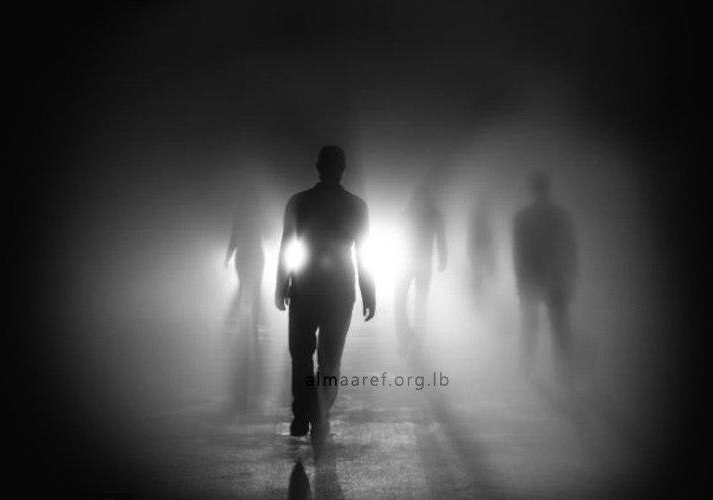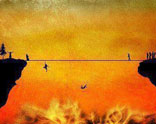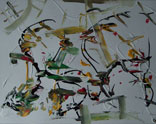THE RETURNING (MA'AD)
Knowledge of the hereafter
Ma'ad is derived from the root word Aud which means to return. Hence. The returning of the spirit (rooh) back to its body is called Ma'ad. Ma'ad is one of the fundamental principles of Islamic faith and belief in it is incumbent upon all muslims. After death every soul shall arise to see the reward or retribution ( as the case may be) of their deeds.
Ma'ad consists of stages Death (Maut), Grave (Qabr), Intermediate Stage (Barzakh), Resurrection (Qayamat) and Paradise (Jannat) or hell (jahannam). Ma'ad can not be perceived by the five senses of man, but can be comprehended by reasoning alone. What happens after death? The Holy Prophet (peace be upon and his household) through the medium of Revelation (Wahy) has explained to us in detail regarding it. Man's senses has its own limitations beyond which it is not possible for him to understand. For example a child in the mother's womb can not perceive the vastness of the outside world. In the same manner, a soul captivated by the influences of matter can not easily understand the hidden world and it's realities. The knowledge of this unseen world is concealed from man and he can only understand it through the medium of the Holy Prophet (peace be upon him and his household) and his Vicegerents, the Holy Aimmah (A.S.). Hence to have a better comprehension of the hereafter, we have to rely totally upon Them, because They are the Inheritors of the knowledge of Allah and His Hidden Wisdom.
Is a person's body affected after death?
Many are of the opinion that after death man's body becomes an absolute nothing like a dry wood, hence the question of reckoning in the grave does not arise.Such doubts are the outcome of sheer ignorance and lack of belief in the unseen (Ghaib). Speech is the effect of the tongue and movements are impressions of a living body. But the spirit (rooh) is motionless and is hence independent of movements whilst dreaming a man's tongue or his lips do not move, and a person awake will bear witness to it. After awakening the person will narrate the discussions he had with people, he will also claim to have traveled far off cities, but his body in reality having laid motionless on the bed all throughout the night.
Dreams (Ru'ya)
Imam Moosa-al-Kazim (A.S.) states that in the former part of creation, man did not dream. Allah sent upon the people His Apostle to guide them towards virtue and warn against evil. The Prophet advised them that if they followed the Right Path as preached by Him, they would be successful and be rewarded in Paradise. But if they erred and did not avoid sin, they would face tribulation in hell. They asked the Prophet as to how they could rely on something which they had never seen. They said that they observed that after death a man's body becomes motionless and turns into dust, how could then he be rewarded or chastised for his actions. It is after this incident that they started dreaming in which they witnessed Allah's rewards in Paradise and His wrath in hell. They went to the Prophet and narrated this to him. The Prophet replied that as in the dreams they met people, conversed with them, and visited far off places, after death even if their bodies would be reduced to dust, they would still taste chastisement or reward (as the case may be) in Paradise or hell.
Death(Maut)
Scholars differ regarding the explanation of death. Some call it a continuous phenomenon (Amre Wujoodi, not the end of life), while others opine that it is a terminal one (Amre Adami, the end of life). But the generally accepted fact is that it is purely a bodily affair. Regarding death it is said that, "It is a continuous process and vice versa to life". The Holy Qur'an says: ﴾Blessed is He in whose hand is the kingdom (of the heavens and the earth), and He has power over all things, Who created death and life that He may try you, (to prove) which of you is best in deeds﴿. (Surah-al Mulk: 1-2) The above verse (Ayah) refers to the purpose of the creation of life and death. Non-existence is not the essence of creation. If death had been an ending process, the word "Khaliq '' (Creation) would not have been used. Death in reality is the divorce of the spirit (rooh) from the body, and can be illustrated by many examples. It can be compared to a sailor estranged from his wrecked ship. The spirit is a light which illuminates the dark body and its components derive benefit from it. Whereas death is the estranger of this light from the body, leaving it again in darkness. It is not true that the spirit enters the body, because it is free to enter and exit. It shares a limited relation with the body, after which it leaves the body for immortality. In short, the detachment of the spirit (Rooh) from the body is called death (Maut). It is incumbent upon us to believe that death is a phenomenon solely governed by the will and command of Almighty Allah only, and He maintains the relation of the spirit to the body from mother's womb till the end. He is the Creator (Khaliq) of all things, and the Giver of life and death. The Holy Qu'ran says: ﴾Allah takes the spirits (Rooh) at the time of their death﴿ (Surah-az-Zumar : 42). Some ignorant people are of the opinion that the Angel of death (Izraeel) is an evil demon and an enemy who estranges us from our children and orphans them. But the reality is that he acts in accordance with the command of Allah only and has no personal options.
Separation of the Spirit (Rooh) from the body
It is narrated in the tradition of Me'raj that a plank is placed in front of Izraeel, on which names of all creatures are written. When Allah wills death of any one of His creatures, the name on the plank disappears, and Izraeel does the needful. It is possible that at one time death of more than one creature may be ordained. Just as many candles can be extinguished in a single puff, more than one spirit can be removed together. Surely Allah is the giver of death as stated in the Quran, ﴾Say (O Prophet) the Angel of death who is given charge of you shall cause you to die﴿. (Surah-as-Sajdah: 11) In another verse it is stated. ﴾Those whom the Angels cause to die while they are unjust to themselves﴿. (Surah-an-Nahl: 28)
Izraeel and his comrade Angels have been assigned the job of removing the spirits of creatures. An army which follows the commands of their king and conquers cities, it is said that the said army has conquered the said cities, but in reality it is the result of the king's military tactics & warfare. Many examples can be given to prove the above, but the fact is that it is beyond comparison.
As Allah has created this world as a house of causes (Darul Asbab), He has also created a cause for death. Disease, murder, accident etc. are some of its causes. These act as reasons for the approach of death, if not there are instances of persons who recover even after a serious illness, while some die in a blink of an eye. These causes also do not have an independent option, unless attested by the command and will of the Almighty.
Spirits of some men are removed with ease while some experience severe difficulty. It is narrated in traditions (Ahadees) that during death some people feel as if their body is being cut asunder by scissors, or are being grinded in a mill, while some feel as if smelling the fragrance of a rose. It is stated in the Qur'an: ﴾Those whom the Angels cause to die in a good state, saying - Peace be on you, enter the garden (of Paradise) for what you did﴿. (Surah-an-Nahl: 32). It is not necessary that the spirits of all believers (Mo'mineen) are removed easily. Even a believer who has done good deeds in his lifetime experiences difficulty during death. This acts as the punishment for sins he committed for which he is atoned for in this very world. While for a non -believer this difficulty is an extra punishment of Allah followed by the ones to come in the Hereafter. ﴾But how will it be when the Angels cause them to die smiting their backs﴿. (Surah-al-Mohammad: 27) It is also possible that a non-believer may not experience difficulty during death, this acts as reward for the good deeds he has committed which is compensated in this very world, leaving their scrolls of deed of any reward. In reality death is an unfortunate event for a non-believer even though he dies in comfort, while it is a blessing and felicity for a believer even though he experiences difficulty during it.
* Manazil Al-Akherah. By SHAIKH ABBAS BIN MOHAMMAD REZA AI-QUM. Chapter 1. Published in Iran, Qum.




















